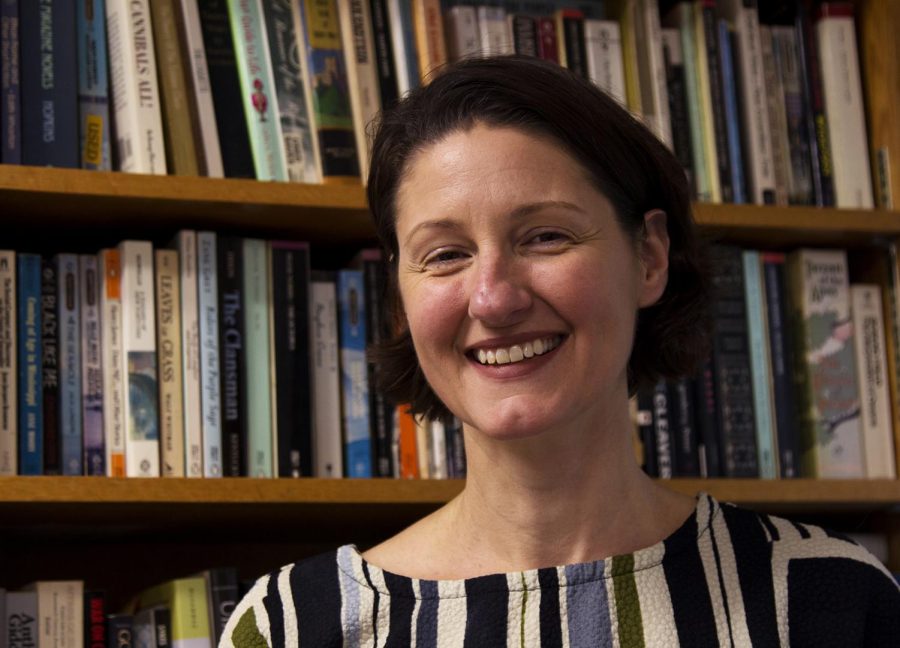Professor to propose behind-bars class
Elaine Frantz, a history professor, is waiting for her proposed class, History of Policing: Inside-Out, to get formally approved by the university.
October 12, 2017
Some Kent State students may have to go to jail to attend class next year.
Elaine Frantz, a new professor in the department of history, is planning to make Kent State the newest university to offer a course through The Inside-Out Prison Exchange Program, an educational program that brings together college students and incarcerated people.
“The idea is that professors get a special set of training about how to teach inside a prison, and then the professors take a group of undergraduate students from their institution into the prison every week, and then have class where the class is half undergraduate students and half incarcerated students,” Frantz said.
Frantz came to Kent State from Duquesne University in Pittsburgh a month ago, where she was involved with their Inside-Out program, which is ongoing and was fostered by Norman Conti, an associate professor in sociology there.
“Ten years ago, I got trained and I brought it back to Duquesne,” Conti said. “I started doing Inside-Out in the Pennsylvania system, and the first time I did a class, it was quite a ways from Duquesne. Elaine was interested, so she rode with me to one of the classes, sat in on one of the classes and really enjoyed it.”
Frantz then began to work with a think tank of prisoners.
“We kind of floundered for a while, but then Elaine came in and joined our group, and sort of really changed the dynamic and got us more focused and had a real dynamic energy with the guys,” Conti said. “We did really accomplish a lot with her.”
At Kent State, however, Frantz, who received her formal training over the summer, would be teaching the class on policing in society.
“Students tend to experience this as sort of revolutionary for them,” Frantz said. “I think everybody finds it an extremely valuable experience intellectually. Now clearly it’s valuable as far as socially, but intellectually, because people are coming from a real wide range of perspectives in the jail, collaborating across those lines is a real intellectual workout.”
Conti said he has often seen a large amount of student interest, and emphasized the value of the unique program.
“Any time you take students off of campus and put them in a very different situation — could be a lot of things, but here it just happens to be prison — and the students start learning across these different boundaries, whether they’re the walls of prison or whether they’re ideas of race or class or whatever,” Conti said, “as soon as that happens, the whole learning environment changes, and you get something that you can’t get otherwise.”
Part of the importance of the class, according to Frantz, is that it benefits both the university students and the incarcerated students — called “inside” students in the program.
“There’s all sorts of stuff that we just agree on because we’re middle class people who have all these sorts of common experiences, we never have to interrogate a lot of things that we believe,” Frantz said. “… So it’s really destabilizing and it forces you to kind of realize what sort of intellectual choices you’ve been making.”
Conti agreed.
“The people in prison are hungry for learning. They’re hungry for a different sort of experience. Their days are very regimented, and in a county jail their days are probably pretty boring, actually,” Conti said. “The chance just to be with other people in a normal setting — when you do this, the room in the jail becomes more like a room in a university, so that’s almost sort of a magical thing.”
Frantz will formally propose the idea in a few weeks, but said she has already seen interest in the idea in her department, including with colleague Shane Strate, an associate professor and undergraduate coordinator in the department of history.
“I think that university programs are looking for opportunities to get students out of the classroom whenever possible, and to study a topic as complex as incarceration is really difficult from a theoretical level,” Strate said. “Something like having students inside of a prison and meeting inmates would do a lot to change their perspectives on the process by personalizing it, by making it less impersonal.”
Inside-Out already has a large influence in the Ohio system, so finding footing at a local jail may not prove difficult, said Conti and Frantz — and the program may have benefits that would outweigh potential difficulties such as finding transportation to the facility.
“The class has an effect on really changing, in a way, almost changing the lives of the people that participate, from the people in prison to the students,” Conti said. “Once you have this experience, it’s hard to look at things the same way anymore.”
Cameron Gorman is the humanities reporter. Contact her at [email protected]

























